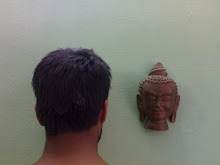There are many ways to begin this review. One might say that it takes great courage and vision to translate a popular short story into cinema. Or, one might say that it takes great courage to make a good regional movie. One might even say that it takes more courage to make a bad movie and think of giving it a theatrical release. There are so many things wrong with Prodyut Kr Deka’s Samiran Baruah ahi ase that it is heart-breaking to decide where to begin. In the Assamese film industry, once in a while comes an Assamese film which comes once in a while. The industry is as dead as Tyrannosaurus Rex and public expectations are as high as the Nilachal. That is why it makes sense if the films that do get released are at least moderately watchable. Mon Jai, for instance was no cinematic gem nor was it contemporary but the depressing tale of four unemployed youths who achieve no redemption gave us much hope. The casting was spot on and the acting was pretty standard. The sad thing about Samiran is that it has an engaging story and a respected cast. The problem is with the manner in which the story is told and the handling of the actors. The keystone plot is of a pair of reporters who must report a fake interview with the eponymous Samiran Baruah (Tapan Das), head of an unnamed liberation army (read ULFA). And then, there are the subplots: Samiran’s return to Guwahati from ‘across the border, the private life of a police officer who has sworn to catch the renegade and a flashback of Samiran’s childhood. The different stories are divided into Tarantinoesque ‘stories’ which completely lack the Tarantino ingenuity and rather, cause a severe confusion of chronology.
It feels terribly unpatriotic and hard-hearted to say this but trust me, with this film, Mr Deka walks into Ed Wood territory- a genre of cinema that is equal parts unintentionally funny and baffling. Characters are often introduced by name and then left out for the entirety of the film. The ‘stories’ are suddenly and inexplicably ended once they begin to engage. Some of the dialogue is mouthed but not voiced. The implications of these unheard words are never revealed nor do they build up suspense of any kind. It is like the silent whisper towards the ending of Lost in Translation but a silent whisper you want to rinse in the Bharalu River, chop into fine bits, put them in a bag with large stones, sink it somewhere and then have your memory erased.
But, let me resume. Like every other film, there is something redeeming in Samiran. It is the realisation that beneath his skin, Prodyut Kr Deka has the soul of a little frustrated adolescent. Ample screen time is given to a swimsuit scene, a bathtub scene, one item song and the most unbearable lovemaking scene in recent cinema- all in a one and a quarter hour film that pretends to deal with questions like statehood, liberty and the need for a vengeful messiah. These techniques belong to another film-maker much loved for the infamous practice of inserting item songs after funerals- Kanti Shah. And like in Kanti Shah, irony, if there is any, is lost to everyone. The audience reaction to Samiran was similar to the reaction to any Kanti Shah film. They laughed at all the ‘wrong’ places and applauded the shameless clichés and awful dialogues. Unfortunately, when it seemed that this particular film would top the so-bad-that-its-good hall of shame, the film turned plain boring. The cinematography, in one word, is pathetic especially the POV shots which are hazy. The censors are inconsistent. In one scene, a burning cigarette is pixelated but in a scene towards the close of the film, one of the actors puffs away gloriously. The subtitles are equally funny. In one scene where the ageing parents of the absconding renegade are musing upon there lost son, an one-liner by the old father is translated as follows:
‘How long you gonna live like this?’
That sounds more Harlem than Hajo.
However, the undisputed champion is the editing. Many times in the movie, it becomes evident that the director started out with the idea of creating an epic but finally decided to make a short film. For lack of footage, the same scene is repeated, sometimes more than once. Silent montages appear unheralded and one hopelessly useless scene of a camera panning over the Guwahati cityscape begins after Samiran’s monologue and continues for a full painful minute. Then there are the pop culture references. Framed photographs of Bhupen Hazarika and Bishnu Prasad Rabha hang from the walls of a room in which a group of young drunks sing Beatles’ songs and yearn for expensive liquor, women and pornography and believe that the return of Samiran Baruah will herald an era of hedonism and debauchery.
The real questions are in the margin- Is it feasible for a romantic nihilistic renegade to lead a violent popular movement? Does the common man really want such a hero? However, the questions are never asked nor even implied. A film with the name of the protagonist in the title suggests a Beckettian character who never turns up. Instead, we have Tapan Das, stubbled owner of a stoned voice walking lost on the Ganeshguri flyover and all the effect is lost.
The film does ask one question though: should Samiran Baruah come or not and ends with the suggestion, ‘Bhabi sauk’ (think about it). On exiting the auditorium, I asked a friend what the hell was the film about. ‘Bhabi sauk’, she said.
(Samiran Baruah Ahi Ase releases in March.)
Subscribe to:
Post Comments (Atom)


No comments:
Post a Comment